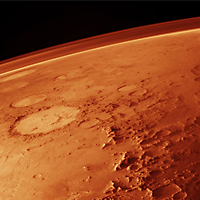
The Mars One project plans to create a human settlement on Mars by 2024. The catch? No human has ever done this before and the trip will be one way. There will be no coming home. Despite this fact, the application process saw thousands of entries from all over the world for what will end up as a four-man crew.
This clearly conveys the international interest that exists for people to go to Mars. However a mission to Mars is not one without risk. Mankind has undertaken 43 missions to Mars to date - 25 of which have failed. So much can go wrong: launch accidents, component malfunction, radiation poisoning during transit and more. Humans can’t land planes in bad weather let alone on a planet where the weather is unpredictable.
The journey to Mars takes between six and nine months. During this time the crew will need to cope in a small confined space, without access to showers despite the many hours of daily exercise they need and the constant hum of equipment that will be keeping them alive. Silence is the last thing they would want to hear. Silence would mean a failure in the life-support systems on board. Silence, if they are lucky, they will never hear again. On Mars: dust storms, sub-zero temperatures and low pressures are just some of the challenges that will await the crew. So why exactly would anyone want to go?
When Neil Armstrong took Man’s first steps on the Moon in 1969 and the Earth watched, countless youngsters were inspired to love science and space. However, we have not gone back to the Moon since 1972. The next generation of children will not have this role model to grow up with. The Moon is the furthest Mankind has gone, and we haven’t been back since the 70s. Mankind has always been the adventurer and Mars is the next logical step to explore. It’s the next big challenge.
If there is - or ever was - any other life in the solar system, it is likely to be on Mars. There are a lot of unexplored locations on Mars and we have never been able to penetrate the surface. If life exists on Mars it will be at least five metres beneath the ground, where radiation cannot penetrate.
Humans need to go to Mars in order to pursue this quest. In the long term, it is also important for the survival of Mankind. The resources on Earth won’t last forever. And the technological advances we gain from a journey to Mars will be useful for life on Earth – renewable energy technologies such as efficient solar panels, waste recycling and water recycling systems can only be beneficial to us.
For the next ten years the candidate astronauts will train intensively in group activities, personal training and technical training. We will need to deal with team challenges, isolation in confined small spaces in remote locations, communication delays from the outside world, and most importantly, to train in a wide skill set that includes medicine, geology, politics etc. It is not going to be easy.
However, the thirst for knowledge has always led scientists to distant places; to the edge of the universe even, for astronomers like me. I am currently researching galaxy clusters – the cosmic giants of the universe. The smallest of these objects can be ten thousand, trillion metres in size. I’ve always been fascinated by space and how big it is; and that’s why I signed up for a one-way trip to Mars. The distance to Mars is a hundred billion times smaller than a galaxy cluster so it’s astonishing to think that humans haven’t been there yet.
I am now among the last 100 candidates to compete to go to Mars. My PhD in Astrophysics has definitely given me an advantage over some of the other applicants. It has prepared me to be independent, patient and a quick learner. I work in a huge collaboration with over 200 people so teamwork is now second nature to me. My experience, and my time at the University of Birmingham, has given me all the skills I will need to take the first important step towards Mars.
Maggie Lieu is currently working on a PhD within the Astrophysics & Space Research Group at the University of Birmingham. You can also follow Maggie on Twitter.